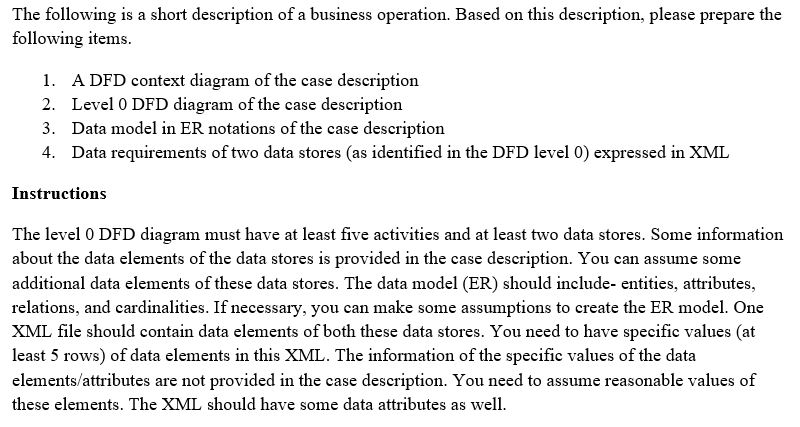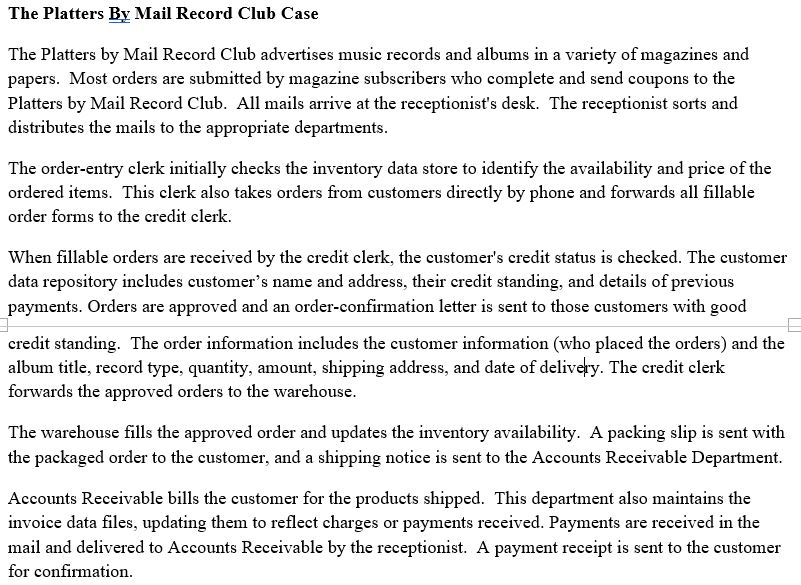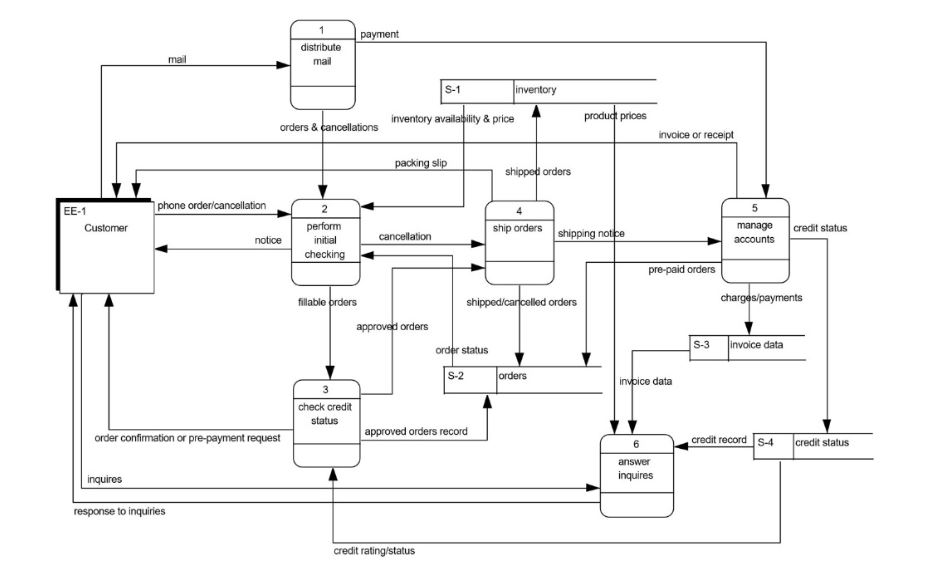Please answer number 3.



The following is a short description of a business operation. Based on this description, please prepare the following items. 1. A DFD context diagram of the case description 2. Level 0 DFD diagram of the case description 3. Data model in ER notations of the case description 4. Data requirements of two data stores (as identified in the DFD level 0) expressed in XML Instructions The level 0 DFD diagram must have at least five activities and at least two data stores. Some information about the data elements of the data stores is provided in the case description. You can assume some additional data elements of these data stores. The data model (ER) should include- entities, attributes, relations, and cardinalities. If necessary, you can make some assumptions to create the ER model. One XML file should contain data elements of both these data stores. You need to have specific values (at least 5 rows) of data elements in this XML. The information of the specific values of the data elements/attributes are not provided in the case description. You need to assume reasonable values of these elements. The XML should have some data attributes as well. The Platters By Mail Record Club Case The Platters by Mail Record Club advertises music records and albums in a variety of magazines and papers. Most orders are submitted by magazine subscribers who complete and send coupons to the Platters by Mail Record Club. All mails arrive at the receptionist's desk. The receptionist sorts and distributes the mails to the appropriate departments. The order-entry clerk initially checks the inventory data store to identify the availability and price of the ordered items. This clerk also takes orders from customers directly by phone and forwards all fillable order forms to the credit clerk. When fillable orders are received by the credit clerk, the customer's credit status is checked. The customer data repository includes customer's name and address, their credit standing, and details of previous payments. Orders are approved and an order-confirmation letter is sent to those customers with good credit standing. The order information includes the customer information (who placed the orders) and the album title, record type, quantity, amount, shipping address, and date of delivery. The credit clerk forwards the approved orders to the warehouse. The warehouse fills the approved order and updates the inventory availability. A packing slip is sent with the packaged order to the customer, and a shipping notice is sent to the Accounts Receivable Department. Accounts Receivable bills the customer for the products shipped. This department also maintains the invoice data files, updating them to reflect charges or payments received. Payments are received in the mail and delivered to Accounts Receivable by the receptionist. A payment receipt is sent to the customer for confirmation. payment distribute mal 5-1 inventory inventory availability & price product prices orders & cancellations invoice or receipt packing slip shipped orders phone order cancellation 2 EE-1 Customer ship orders shipping notice credit status cancellation manage accounts notice perform initial checking pre-paid orders fillable orders shipped car celled orders charges/payments approved orders order status S-3 invoice data S-2 orders invoice data check credit status approved orders record order confirmation or pre-payment request credit record S-4 credit status answer inquires inquires response to inquiries credit rating/status The following is a short description of a business operation. Based on this description, please prepare the following items. 1. A DFD context diagram of the case description 2. Level 0 DFD diagram of the case description 3. Data model in ER notations of the case description 4. Data requirements of two data stores (as identified in the DFD level 0) expressed in XML Instructions The level 0 DFD diagram must have at least five activities and at least two data stores. Some information about the data elements of the data stores is provided in the case description. You can assume some additional data elements of these data stores. The data model (ER) should include- entities, attributes, relations, and cardinalities. If necessary, you can make some assumptions to create the ER model. One XML file should contain data elements of both these data stores. You need to have specific values (at least 5 rows) of data elements in this XML. The information of the specific values of the data elements/attributes are not provided in the case description. You need to assume reasonable values of these elements. The XML should have some data attributes as well. The Platters By Mail Record Club Case The Platters by Mail Record Club advertises music records and albums in a variety of magazines and papers. Most orders are submitted by magazine subscribers who complete and send coupons to the Platters by Mail Record Club. All mails arrive at the receptionist's desk. The receptionist sorts and distributes the mails to the appropriate departments. The order-entry clerk initially checks the inventory data store to identify the availability and price of the ordered items. This clerk also takes orders from customers directly by phone and forwards all fillable order forms to the credit clerk. When fillable orders are received by the credit clerk, the customer's credit status is checked. The customer data repository includes customer's name and address, their credit standing, and details of previous payments. Orders are approved and an order-confirmation letter is sent to those customers with good credit standing. The order information includes the customer information (who placed the orders) and the album title, record type, quantity, amount, shipping address, and date of delivery. The credit clerk forwards the approved orders to the warehouse. The warehouse fills the approved order and updates the inventory availability. A packing slip is sent with the packaged order to the customer, and a shipping notice is sent to the Accounts Receivable Department. Accounts Receivable bills the customer for the products shipped. This department also maintains the invoice data files, updating them to reflect charges or payments received. Payments are received in the mail and delivered to Accounts Receivable by the receptionist. A payment receipt is sent to the customer for confirmation. payment distribute mal 5-1 inventory inventory availability & price product prices orders & cancellations invoice or receipt packing slip shipped orders phone order cancellation 2 EE-1 Customer ship orders shipping notice credit status cancellation manage accounts notice perform initial checking pre-paid orders fillable orders shipped car celled orders charges/payments approved orders order status S-3 invoice data S-2 orders invoice data check credit status approved orders record order confirmation or pre-payment request credit record S-4 credit status answer inquires inquires response to inquiries credit rating/status









